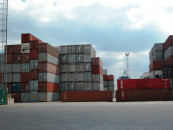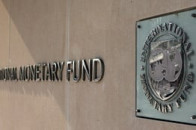PTI govt plans to abolish 3% VAT on 32 goods
May also lower sales tax liabilities for car assemblers; move will hit FBR's tax revenues

May also lower sales tax liabilities for car assemblers; move will hit FBR's tax revenues. PHOTO: REUTERS
The Ministry of Finance and Revenue will (today) table a summary before the federal cabinet to get its nod for amending the Sales Tax Act of 1990 to give effect to these tax concessions, highly placed sources told The Express Tribune on Monday.
The Ministry of Finance has proposed the abolition of 3% value added tax which is currently charged on 32 types of goods that are subject to maximum retail prices, according to the top officials. All the imported items are currently subject to 17% sales tax and 3% value added tax, bringing total liability to 20%.
Once approved by the federal cabinet, the 32 types of imported items will be subject to a 17% standard sales tax. This will also significantly hit the Federal Board of Revenue's (FBR) revenue collection, which has fallen short of the target by Rs64 billion in the first two months of the current fiscal year.
The finance ministry has proposed to exclude imported storage batteries, auto parts, tires and tubes from the retail price taxation. The goods are taxed on the maximum retail price under the Third Schedule of the Sales Tax Act.
The Third Schedule authorises the FBR to collect 17% standard sales tax on the higher retail prices instead of suppliers or manufacturers' prices, which are far lower than the retail prices.
The lower taxation benefits are only proposed to be approved for the car manufacturers and assemblers, according to the finance ministry officials.
Retail prices are the maximum and 17% tax on the retail price of a good significantly increases the tax liability of a person and a company.
These proposals are also against the strategy of FBR Chairman Syed Shabbar Zaidi, who wanted to tax maximum goods on their retail prices aimed at discouraging tax evasion.
At present, there are 32 types of consumable and durable goods covered in the Third Schedule. If the federal cabinet decides to approve the summary, the number of items subject to retail price taxation will come down to 29.
The Pakistan Tehreek-e-Insaf (PTI) government expanded the list of items taxed at their retail prices in the fiscal year 2019-20 budget. The 3% value-added tax on all imported goods had also been slapped in the budget.
Before the 2019-20 budget, there were only 20 types of items that were subject to retail price taxation.
Sources said the decision to withdraw 3% tax and exclude the goods for car assemblers from the scope of retail price taxation was taken at the highest political level. They argued that these sectors sought taxation relief due to the economic slump, which had started adversely affecting their sales and production.
Car assemblers have once again managed to get relief from the government instead of reducing their profits.
According to 12th Schedule of the Sales Tax Act, which authorises the collection of 3% value added tax, the value added sales tax shall be levied and collected at the import stage on all taxable goods as are chargeable to tax under Section 3 of the Sales Tax Act.
The 3% value-added tax has also been proposed to be withdrawn on the sale of household electrical goods, including air conditioners, refrigerators, deep freezers, televisions, recorders and players, electric bulbs, tube lights, electric fans, electric irons, washing machines and telephone sets.
Household gas appliances, including the cooking range, ovens, geysers and gas heaters, foam or spring mattresses and other foam products for household use, paints, distempers, enamels, pigments, colours, varnishes, gums, resins, dyes, glazes, thinners, blacks, cellulose lacquers and polishes sold in retail packaging are also planned to be exempted from 3% value addition tax.
The government has planned to abolish the 3% value addition tax currently charged on the sale of fruit juices, vegetables, ice creams, aerated water or beverages, syrups and squashes, cigarettes, toilet soaps, detergents, shampoos, toothpaste, shaving cream, perfumes, and cosmetics.
Other items are tea, powder drinks, milky drinks, toilet paper, and tissue paper, spices sold in retail packaging bearing brand names and trademark, shoe polish and shoe cream, fertiliser, cement sold in retail packaging, mineral and bottled water.
Lubricating oils, brake fluids, transmission fluid and other vehicular fluids sold in retail packaging, storage batteries excluding those sold to automotive manufacturers or assemblers, tyres and tubes excluding those sold to automotive manufacturers or assemblers, motorcycles, auto rickshaws, biscuits in retail packaging with brand name, tiles and auto parts in retail packaging will also be exempted from the 3% value-added tax.
The finance and revenue ministry noted that these tax concessions could be given by the federal government through a notification without promulgating a presidential ordinance or introducing a supplementary Finance Bill in the National Assembly. All these items will still be subject to 17% standard sales tax.



















COMMENTS
Comments are moderated and generally will be posted if they are on-topic and not abusive.
For more information, please see our Comments FAQ